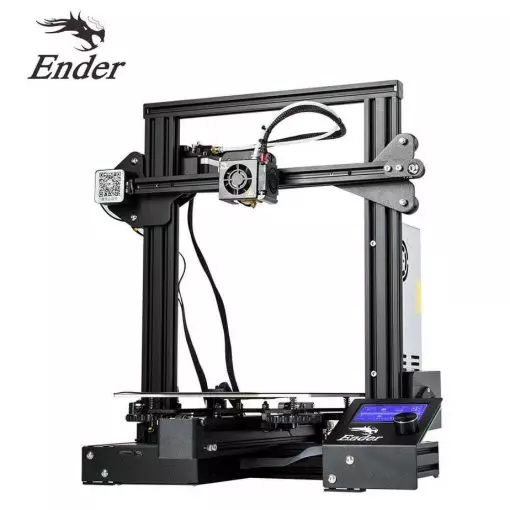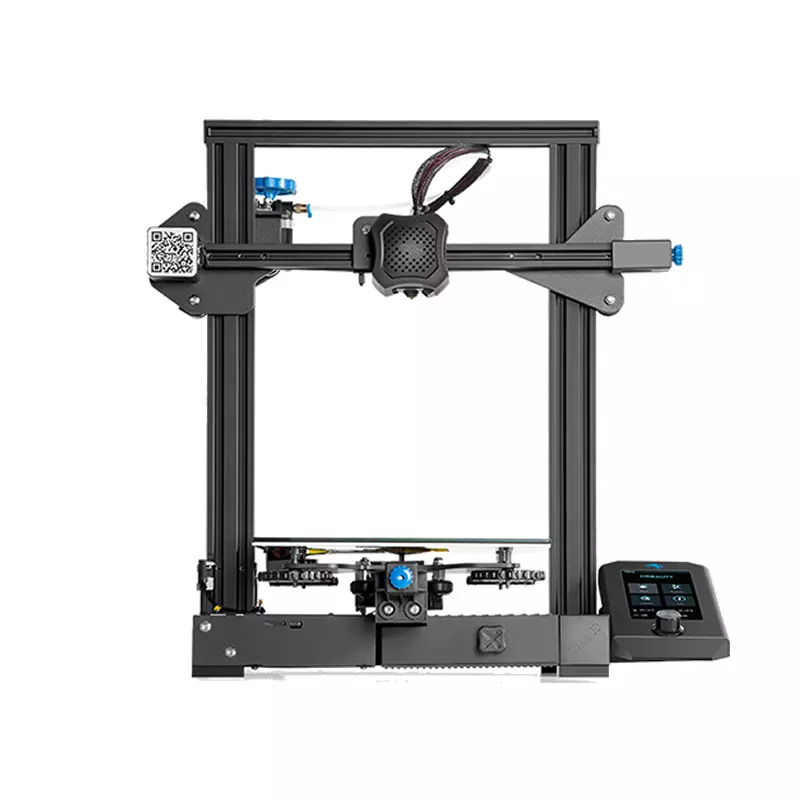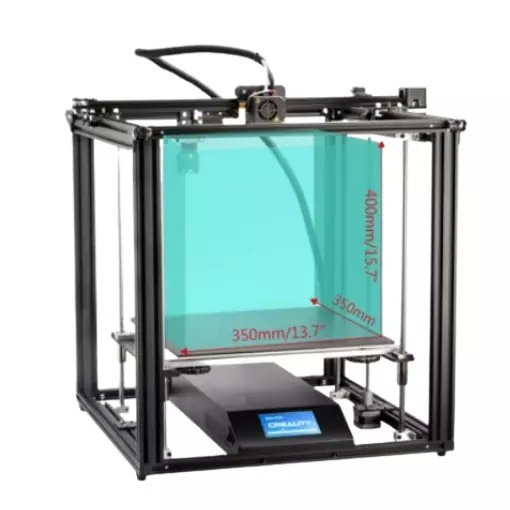Compare Ender 3 vs Ender 3 V2 vs Ender 5 Plus
Comparison between the best 3D printers
Choose the best 3D printer at the best price. The cheapest 3D printers are here.
Buy a 3D printer here with 3D Fila.
 |
 |
 |
|
| Model | Ender 3[BUY Ender 3] |
Ender 3 V2[BUY Ender 3 V2] |
Ender 5 Plus[BUY Ender 5 Plus] |
| Printing Material | Filament | Filament | Filament |
| Estimated price | $210,00 | $289,00 | $599,00 |
| Fabricante | Creality 3D | Creality 3D | Creality 3D |
| Release Year | 2018 | 2022 | 2019 |
| Print Volume [mm] | 220x220x250 | 220x220x250 | 350x350x400 |
| Printer Size [mm] | 440x440x465 | 470x475x620 | 632x619x666 |
| Weight [kg] | 6,62 | 7,8 | 18,2 |
| Power Loss Recovery | NO | YES | YES |
| Enclosed printer | NO | NO | NO |
| Bed Leveling | Manual | Manual | Automatic |
| Filament End Sensor | NO | NO | YES |
| Bed type | Heated | Heated | Heated |
| Power supply system | Bowden | Bowden | Bowden |
| Standard nozzle | 0,4 | 0,4 | 0,4 |
| Maximum Nozzle Temperature [°C] | 255 | 255 | 260 |
| Maximum Bed Temperature [°C] | 110 | 100 | 100 |
| Maximum printing speed [mm/s] | 180 | 180 | 180 |
| Filament holder | YES | YES | YES |
| Camera for supervision | NO | NO | NO |
| Recommended filaments | PLA, TPU, ABS, PETG | PLA, TPU, ABS, PETG | PLA, TPU, ABS, PETG |
| Recommended slicers | Cura, Simplify, Slic3r | Cura, Simplify, Slic3r | Cura, Simplify, Slic3r |
| Maximum Resolution [mm] | 0,1 | 0,1 | 0,1 |
| Processor | 8 bits | 32 bits | 32 bits |
| Display | Mono | Touchscreen TFT 4,3'' | Touchscreen TFT 4,3'' |
| Power Supply | 24V / 270W | 24V / 360W | 24V / 504W |
| Connectivity | SD / USB | SD / USB | SD / USB |
| Operating systems | Windows, Mac, Linux | Windows, Mac, Linux | Windows, Mac, Linux |
| Date of registration in the system | 2021-04-13 | 2021-04-15 | 2021-04-14 |
| Release date | 2018 | 2022 | 2019 |
| Extra features | The Ender 3 V1 is a DIY assembly 3D printer, a sales leader since 2017, standing out for its cost-benefit. With a wide printing capacity, it has a CNC machined structure for precision and stability. It offers high-precision prints with low noise, thanks to its innovative V-profile and pulleys. It has a self-adhesive magnetic platform for easy removal of models and excellent adhesion. The Ender 3 heats up quickly, reaching 100°C in 5 minutes, ideal for agile prints. It includes protection against power failures, allowing you to resume printing after interruptions, saving time and material. | The Creality Ender-3 V2, with a design inspired by the Prusa i3 series, stands out for its DIY assembly structure. With an area of ??250x250x250mm, it supports a variety of projects. It has a micro-USB port, microSD slot and integrated tool drawer. The tension adjustment adapts to different regions. Its manual print bed leveling process requires attention, but offers an enriching experience. Ideal for 3D printing enthusiasts willing to invest time in assembly and adjustment. | The Ender 5 Plus offers a large print volume (350x350x400 mm) and fast assembly. It includes a BLTouch sensor, but with range limitations. It stands out for its dimensional accuracy, although it requires adjustments to the slicer settings. Despite the noise, its integrated design saves space, and includes features such as a filament sensor and power resumption. Ideal for large projects, it requires refinement in the settings for high-quality prints. |
| Support for multiple colors and materials (AMS and CFS) | NO | NO | NO |
Notes * |
|||
| Cost-benefit | 6 / 10 | 7 / 10 | 6 / 10 |
| Hardware | 0.5 / 10 | 2.1 / 10 | 2 / 10 |
| Screen | . | . | . |
| Print volume | 3 / 10 | 3 / 10 | 4 / 10 |
| Performance | 1 / 10 | 1 / 10 | 1 / 10 |
| [BUY Ender 3] | [BUY Ender 3 V2] | [BUY Ender 5 Plus] |
Conclusion |
| In conclusion, when comparing the Ender 3, Ender 3 V2, and Ender 5 Plus from Creality 3D, it is essential to consider several factors, such as price, print volume, features, and overall value. The **Ender 3** stands out as an excellent entry-level option, offering great cost-effectiveness and decent performance for hobbyists and new users. While it lacks advanced features such as power loss recovery and automatic bed leveling, its manual leveling process may appeal to users looking to enhance their skills and understanding of 3D printing. The **Ender 3 V2** builds upon the original design with improvements in usability and aesthetics, including a better display and additional features that make it easier to use while maintaining a similar price point. It remains an attractive choice for enthusiasts who want a reliable printer with enhanced capabilities without breaking the bank. On the other hand, the **Ender 5 Plus** is geared toward those who need larger print volumes and are willing to invest more for additional features such as automatic bed leveling and a filament sensor. It's ideal for users who frequently undertake larger projects and require more space and accuracy in their prints. However, its higher price may not offer the same cost-benefit ratio as the Ender 3 or 3 V2 for users who primarily work on smaller prints. Ultimately, if budget is a primary concern and you are starting, the **Ender 3** is the best option due to its affordability and decent performance. For those looking for slightly better features without a significant price increase, the **Ender 3 V2** is the optimal choice. The **Ender 5 Plus** is best suited for experienced users focused on larger projects who can justify the higher investment. Each printer serves distinct user needs, making them compelling options in their price categories. |

